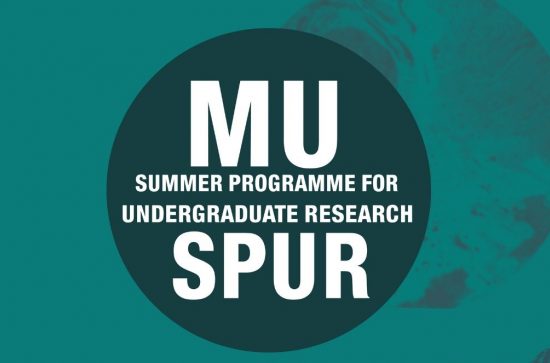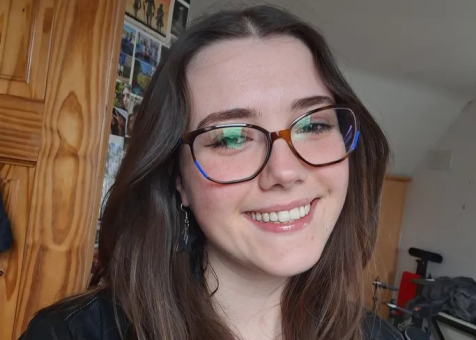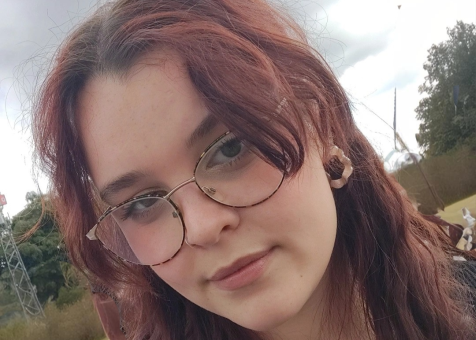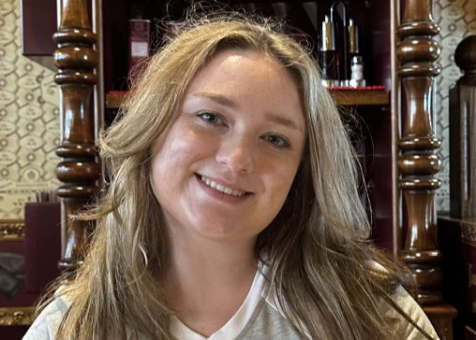
Monday, July 29, 2024 - 10:30
This summer, three of our fantastic undergraduate students participated in the Summer Programme for Undergraduate Research (SPUR) on projects mentored by staff in the Department of Psychology*. In this blog post, Isolina Busto Gilligan, Caoimhe Fleming and Jaime Ní Chinsealach share their reflections as they reach the end of their SPUR experience:
Isolina:

I worked on the PRISM (PRovision of Informal Support for Mental Health) project for six weeks. This project, in collaboration with Mental Health Ireland, is investigating the support given by young people to their friends going through a tough time. The project has been co-designed with an advisory group of young people aged 18-25 with lived experience of providing support to a friend. The project aims to discover the type of support given to friends, the experience of giving this support, and if there is any support needed for these supporters. My role in this project was to research dissemination strategies, in particular effective ways of disseminating findings to a young audience. Dissemination involves communicating the findings to target audiences. In this project, the target audience is young people ages 18-25. I conducted a literature review on youth dissemination strategies and searched for dissemination case studies. I also investigated important considerations for dissemination, and frameworks as well as facilitators and barriers to effective dissemination. I then presented my findings to the research team. I also got the unique opportunity to visit Mental Health Ireland’s head office and learn about the work they do. Lastly, I developed co-design workshop materials based off my findings so that the advisory group could decide on the best dissemination strategy for the PRISM project findings.
My experience in the SPUR project gave me an insight into how real-life research operates, I got to see some of the work academics do day-to-day. As well as working on the literature review, I also assisted with participant recruitment. Participant recruitment is a vital part of research, but few people get to learn how it works before doing it themselves in their own projects. I now have a clearer idea of the amount of work involved in participant recruitment, which is something people might overlook when planning a research project to begin with. I also learned about other aspects of research such as ethics and funding thanks to my mentor Dr Sadhbh Byrne who explained these to me and gave me guidance throughout the project. I feel I improved not just my research skills but my professional skills and my ability to work as part of a team and build professional relationships, which is something that is important in any job. Overall, my experience was a positive one. I especially enjoyed making the presentation and workshop materials and working on my research poster as I was able to be creative with my findings. I believe my involvement in SPUR and the things I learned will stand to me in my final year project and beyond.
Caoimhe:

My SPUR internship was part of an international study that is examining the effects of sleep and spatial navigation. Spatial navigation relates to the brain’s ability to find locations and remember where key locations are. Humans heavily rely on this skill to live their everyday lives, to get from place A to B. The latest research shows that one of the first signs of Alzheimer’s Disease is the decline of patients’ navigation abilities, putting spatial navigation at the forefront of research into Alzheimer’s Disease. Further research has suggested that there may be a link between sleep patterns and navigation skills. The possibility that that sleep duration and quality could impact spatial navigation had not yet been examined prior to the start of this study.
The model of the study involves participation over the course of a week, with a call-back in wintertime. I worked on recruiting participants and helping them get set up with the various applications that were needed for the study, along with all of the activation codes. On the first day of the study, participants are asked to play Sea Hero Quest (a spatial navigation game) and answer a 22-question survey about their sleep over the last month. For the rest of the week, they are asked to answer a short survey every morning when they wake up, reporting on their sleep from the night before. On the last day of the study, participants play Sea Hero Quest once more. Along with this, participants download an app that tracks their screentime and daily movement over the week of the study. The study has a four-to-six-month call-back time as the study is also exploring whether any seasonal changes to sleep affect people’s navigation performance. This meant that it was crucial for me to collect the participants’ information details. Along with the recruitment of the participants, I also spent a lot of time extracting the raw data from the various applications that were used and inputting them into an Excel file. This job was very important, however it took time, as each participant had a minimum of seven files that needed to be ran through a JSON reader before manually being inputted.
SPUR gave me a true insight into how psychological studies are ran, how difficult it can be to recruit participants, the small problems can arise and the importance of problem-solving. I think that SPUR was challenging in the best of ways. I believe that I have learned so much about what research studies entail over just these six weeks. I would not have had this foresight previously; from big problems such as applications being incompatible, to smaller ones such as participants not replying to emails. I am glad that I have had this opportunity as I think that SPUR was challenging in the best way possible, and I know that this experience will stand to me as I continue into my final year of college, and beyond that into my professional career.
Jaime:

I worked for the PROMOTE project, a digitised network specifically designed to assist female Early Career Researchers (ECRs). It aims to support female ECRs through providing 3 main sources of information: promotion applications, grant applications and publications. Regardless of whether the applications/publications were successful or unsuccessful, they will act as valuable resources female ECRs can learn from. Throughout the course of my SPUR project, I learned in depth about the unique barriers female researchers face, such as the leaky academic pipeline and the motherhood penalty to name just a few. Such issues emphasise the importance of supportive networks for female ECR career development.
I worked as a research assistant for the PROMOTE project, in which I completed a range of different tasks over the course of 6 weeks. I analysed the feedback of their first workshop held in Maynooth University. I aided and provided support for a funding application and an academic article abstract. I updated the social media and attended the IRESI poster event alongside one of the main Principal Investigators (PIs). I created an infographic and learned how to conduct a systematic review using Rayyan. I made a PowerPoint about PROMOTE to present to the two main PIs of the project and, additionally, I attended my first academic conference during my SPUR project.
I loved participating in this SPUR project as I developed my competencies across a range of skills and, additionally, had the invaluable experience of learning how the world of research works through a hands-on experience. I had a very positive experience networking with individuals in the ALL Institute and the School of Business, and the supportive atmosphere helped me develop a clearer idea for how to approach a career in research. I really enjoyed the opportunity to attend academic events such as the poster event, the academic conference and, additionally, a fascinating lecture in which Dr Ebun Joseph discussed intersectionality. Participating in this SPUR project has given me the perfect opportunity to fully understand what a career in research involves. I would like to thank my mentors Dr Marian Crowley-Henry, Dr Holly Foley, and Dr Katriona O’Sullivan for their guidance and for making such an amazing experience possible.
*Note that the PROMOTE project, in which Jaime participated, is a collaborative project hosted by the School of Business, the ALL Institute, and the Department of Psychology.
Congratulations once again to Isolina, Caoimhe and Jaime on your participation in SPUR, with congrats also to Cal De Nicolas Audoin, Kate Wright, and Sara Higgins, students from the Department of Psychology who participated in SPUR projects hosted by other departments across the university. The future of research is bright!
To learn more about the Summer Programme for Undergraduate Research (SPUR), see here.
